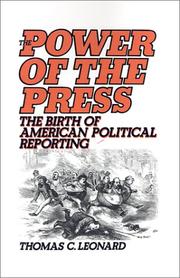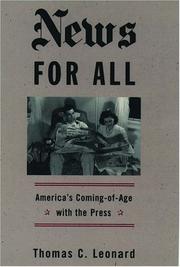| Listing 1 - 10 of 10 |
Sort by
|
Book
ISBN: 9780691169590 Year: 2016 Publisher: Princeton Oxford Princeton University Press
Abstract | Keywords | Export | Availability | Bookmark
 Loading...
Loading...Choose an application
- Reference Manager
- EndNote
- RefWorks (Direct export to RefWorks)
Economic schools --- Economics --- United States --- History --- Progressivism (United States politics) --- Eugenics --- Economic policy --- To 1933 --- Social conditions --- 1865-1918
Book
ISBN: 0195022394 Year: 1978 Publisher: New York Oxford University Press
Abstract | Keywords | Export | Availability | Bookmark
 Loading...
Loading...Choose an application
- Reference Manager
- EndNote
- RefWorks (Direct export to RefWorks)
Guerre dans la littérature --- Oorlog in de literatuur --- War in literature --- Public opinion --- War in literature. --- War --- Public opinion. --- United States --- History, Military. --- History [Military ]

ISBN: 0195037197 Year: 1986 Publisher: New York Oxford University
Abstract | Keywords | Export | Availability | Bookmark
 Loading...
Loading...Choose an application
- Reference Manager
- EndNote
- RefWorks (Direct export to RefWorks)
Book
ISBN: 019505184X Year: 1987 Publisher: New York : Oxford University Press,
Abstract | Keywords | Export | Availability | Bookmark
 Loading...
Loading...Choose an application
- Reference Manager
- EndNote
- RefWorks (Direct export to RefWorks)
Press and politics --- Presse et politique --- History --- Histoire

ISBN: 0195064542 Year: 1995 Publisher: New York : Oxford University Press,
Abstract | Keywords | Export | Availability | Bookmark
 Loading...
Loading...Choose an application
- Reference Manager
- EndNote
- RefWorks (Direct export to RefWorks)
American newspapers --- Journaux américains --- History. --- Histoire
Book
ISBN: 9781400874071 Year: 2016 Publisher: Princeton, NJ
Abstract | Keywords | Export | Availability | Bookmark
 Loading...
Loading...Choose an application
- Reference Manager
- EndNote
- RefWorks (Direct export to RefWorks)
Multi
ISBN: 9781400874071 9780691175867 Year: 2017 Publisher: Princeton, N.J.,
Abstract | Keywords | Export | Availability | Bookmark
 Loading...
Loading...Choose an application
- Reference Manager
- EndNote
- RefWorks (Direct export to RefWorks)
Book
ISBN: 0691169594 0691175861 1400874076 Year: 2016 Publisher: Princeton, NJ : Princeton University Press,
Abstract | Keywords | Export | Availability | Bookmark
 Loading...
Loading...Choose an application
- Reference Manager
- EndNote
- RefWorks (Direct export to RefWorks)
In Illiberal Reformers, Thomas Leonard reexamines the economic progressives whose ideas and reform agenda underwrote the Progressive Era dismantling of laissez-faire and the creation of the regulatory welfare state, which, they believed, would humanize and rationalize industrial capitalism. But not for all. Academic social scientists such as Richard T. Ely, John R. Commons, and Edward A. Ross, together with their reform allies in social work, charity, journalism, and law, played a pivotal role in establishing minimum-wage and maximum-hours laws, workmen's compensation, antitrust regulation, and other hallmarks of the regulatory welfare state. But even as they offered uplift to some, economic progressives advocated exclusion for others, and did both in the name of progress. Leonard meticulously reconstructs the influence of Darwinism, racial science, and eugenics on scholars and activists of the late nineteenth and early twentieth centuries, revealing a reform community deeply ambivalent about America's poor. Illiberal Reformers shows that the intellectual champions of the regulatory welfare state proposed using it not to help those they portrayed as hereditary inferiors but to exclude them.
Eugenics --- Progressivism (United States politics) --- Economics --- History. --- History. --- History. --- United States --- United States --- United States --- Social conditions --- Economic policy --- Economic conditions
Digital
Year: 2009 Publisher: Cambridge, Mass National Bureau of Economic Research
Abstract | Keywords | Export | Availability | Bookmark
 Loading...
Loading...Choose an application
- Reference Manager
- EndNote
- RefWorks (Direct export to RefWorks)
Can a rational choice modeling framework help broaden our understanding of anorexia nervosa? This question is interesting because anorexia nervosa is a serious health concern, and because of the following issue: could a rational choice approach shed useful light on a condition which appears to involve "choosing" to be ill? We present a model of weight choice and dieting applicable to anorexia nervosa, and the sometimes-associated purging behavior. We also present empirical evidence about factors possibly contributing to anorexia nervosa. We offer this analysis as a consciousness-raising way of thinking about the condition.
Book
Year: 2009 Publisher: Cambridge, Mass. National Bureau of Economic Research
Abstract | Keywords | Export | Availability | Bookmark
 Loading...
Loading...Choose an application
- Reference Manager
- EndNote
- RefWorks (Direct export to RefWorks)
Can a rational choice modeling framework help broaden our understanding of anorexia nervosa? This question is interesting because anorexia nervosa is a serious health concern, and because of the following issue: could a rational choice approach shed useful light on a condition which appears to involve "choosing" to be ill? We present a model of weight choice and dieting applicable to anorexia nervosa, and the sometimes-associated purging behavior. We also present empirical evidence about factors possibly contributing to anorexia nervosa. We offer this analysis as a consciousness-raising way of thinking about the condition.
| Listing 1 - 10 of 10 |
Sort by
|

 Search
Search Feedback
Feedback About UniCat
About UniCat  Help
Help News
News